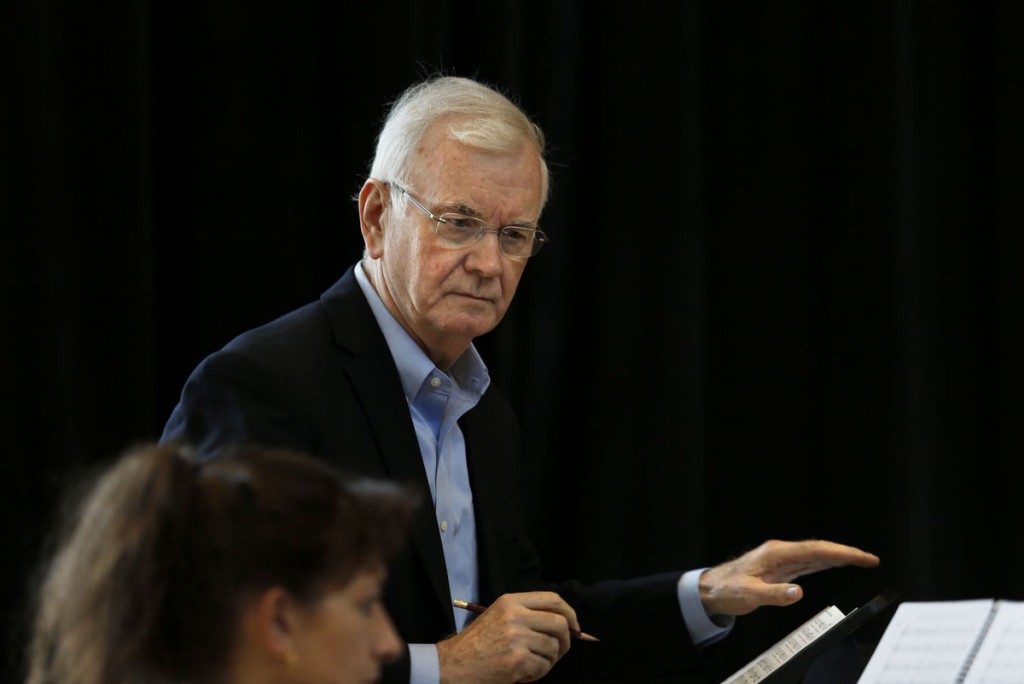Schuman “Triptych,” Moriarty premiere highlights of Frost Symphony concert

Richard Moriarty’s “We That Wait” was given its world premiere by the Frost Symphony Orchestra Friday night. Photo: Stephen M. Katz/The Virginian-PIlot
The abbreviated classical component of Festival Miami concluded Friday night at UM Gusman Concert Hall with a program of American music by the Frost Symphony Orchestra led by Thomas Sleeper. Two of the four works presented were world premieres and the other two had been given their first performances by the University of Miami Symphony in its pre-Frost branding days.
William Schuman’s New England Triptych is an American classic. Based on three hymns by Colonial-era composer William Billings, the score was commissioned by Andre Kostelanetz who conducted the UM premiere in 1956.
Schuman was one of America’s towering musical figures. Composer of ten symphonies, numerous chamber, choral and dance scores, concertos and orchestral works, he was also president of the Juilliard School and founding president of Lincoln Center. The sinuous and bristling elaborations of Billings’ melodies are typical of Schuman’s mastery. This restless, harmonically lean work channels a quintessentially American sound and Sleeper’s performance fully captured both its stirring and poignant moments.
Whipcrack brass were the vital fulcrum for Schuman’s setting of “Be Glad Then, America.” The strings handled the contrapuntal writing with precision and snappy assurance and provided tonal depth for the more austere, straightforward version of “When Jesus Wept.” The opening drum, bassoon and oboe lines of that movement were beautifully played. Schuman’s setting of “Chester” traverses Billings’ theme as both liturgical music and marching song for the Continental Army. Sleeper’s thrusting leadership and the ensemble’s brilliant playing did full justice to Schuman’s vignettes.
Composer Richard Moriarty is a late bloomer. Following his retirement from a medical career and professorship at Eastern Virginia University, Moriarty studied composition at Old Dominion University and the Juilliard European-American Alliance composition program in Paris. His teachers include Adolphus Hailstork and Richard Danielpour.
Moriarty’s song cycle We That Wait, which received its world premiere, views the Civil War mostly through the eyes of women. With texts by the New Englander Emily Dickinson and three Southern women plus a poem by Walt Whitman, the work follows the conflict from initial euphoria through brutality and death to a longing for peace. While he may have come to ]composition late in life, Moriarty sets verses with the facility and sophisticated flair of a Ned Rorem.
The long arioso lines and colorful orchestration of Dickinson’s “He Went as Soldiers” contrasts with the wild leaps of register and dissonance for Whitman’s “Beat! Beat! Drums!” Here the martial rhythms are menacing rather than joyous. Evocative chimes convey the sorrow of Emily Wren’s “We Have Parted.”
Two harps have prominent roles in the lyrical threnody of Dickinson’s “They Dropped Like Flakes.” Soft trumpet calls at the lyric’s conclusion are particularly powerful and effective. Moriarty paints a death-laden soundscape for Dickinson’s “After Great Pain” with terse string figures suggesting bleakness. The final Prayer for Peace by an anonymous ‘Lady of New Orleans’ matches the call for an end to tragedy and destruction with a spacious and eloquent melody.
Moriarty’s work is a fine addition to the vocal literature. Frost faculty member Robynne Redmon brought a warm mezzo timbre with power and strength in the upper register and dramatic conviction to Moriarty’s challenging vocal writing. The score utilizes a large orchestra and Sleeper and the players brought out both the subtleties and violent eruptive moments. Moriarty was present to share the audience’s enthusiastic response with the soloist and conductor.
Following Schuman’s masterpiece of Americana and Moriarty’s moving cycle, the program’s second half proved less engrossing. James M. Stephenson’s There are no words originated in a version for 13 players. Friday’s performance was the premiere of the orchestral version. Stephenson conveys his anger and sadness at the tragic shooting of nine people in the Emmanuel African Methodist Episcopal Church in Charleston, South Carolina in 2015. Nine chords, becoming gradually softer, open the work to commemorate the dead.
There is more than a touch of John Williams in Stephenson’s sweeping themes. Despite the somber inspiration, much of the score sounds like a high-end soundtrack but there are effective moments, especially the suggestions of jazz and the hymn Amazing Grace near the conclusion.
Frost faculty member Raul Murciano, Jr’s Symphony No. 1 (Celebración), which Sleeper premiered in 1996, is considerably more ambitious. Contrasting celebration with despair, Murciano includes a Spanish language narrative by writer Carlos A. Diaz in two of the three movements.
Although delivered with conviction by actor Andy Quiroga, there was neither a translation in the program nor projected surtitles so it was impossible for a non-Spanish speakers to understand or judge the text’s effectiveness with the score. Musically Murciano’s post-modern mix of Latin dance rhythms and atonal gestures almost works for two movements. The final section, after a promising balletic beginning in Stravinskian manner, becomes diffuse with a less than effective conclusion. The large orchestration abounds with piquancy and flashy brass and percussion.
Throughout the concert, Sleeper and his student musicians served all of the composers with full-throttle advocacy. This is the type of programming that needs to be heard more frequently at Festival Miami.
Posted in Performances
One Response to “Schuman “Triptych,” Moriarty premiere highlights of Frost Symphony concert”
Leave a Comment
Sat Feb 11, 2017
at 3:41 pm
1 Comment







Posted Feb 13, 2017 at 9:00 am by Dorothy Hindman
Thank you, South Florida Classical Review, for a wonderful read encapsulating a wonderful concert. I appreciate your ongoing and high quality writing that supports the Maestro Sleeper and the Frost Symphony Orchestra’s extraordinary programming. Thank you for raising our local music to the national consciousness.